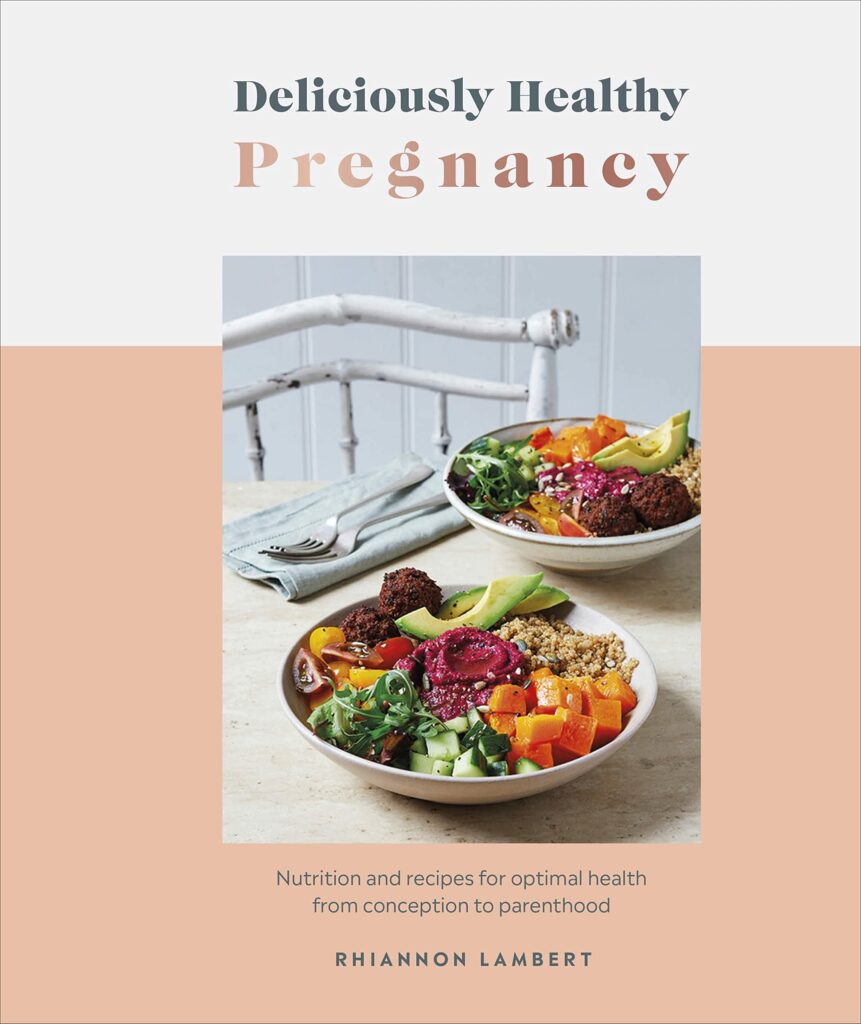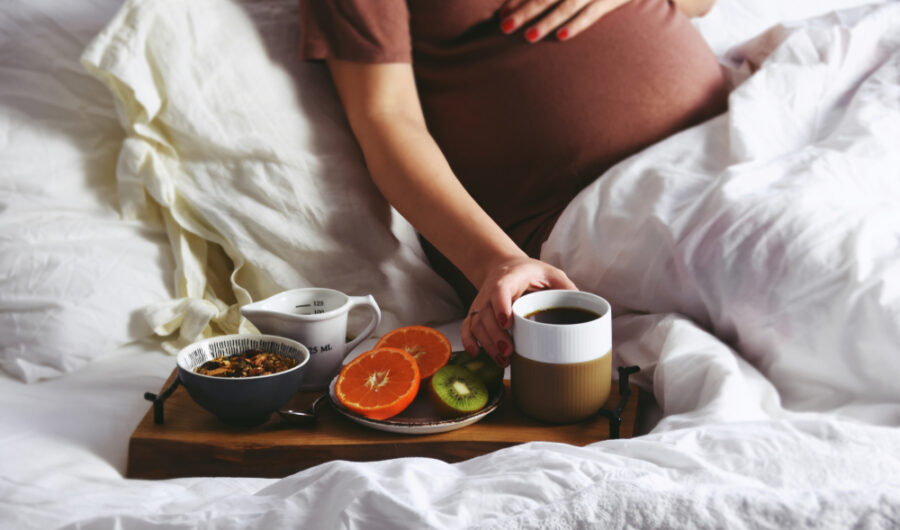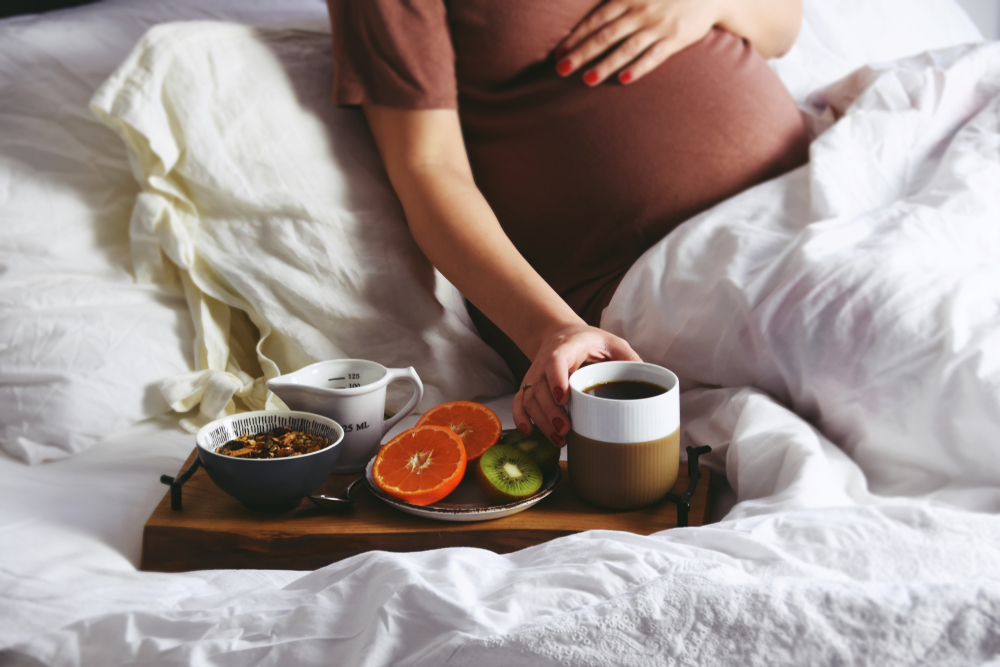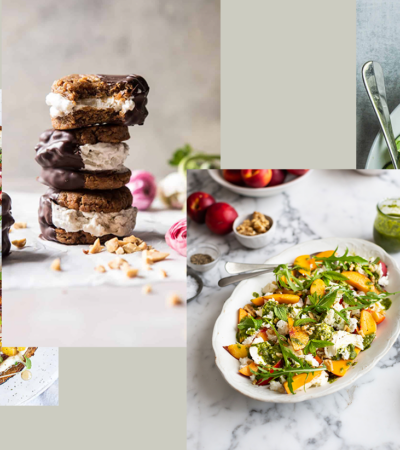Essential vitamins and minerals and phytonutrients are key for a healthy pregnancy, providing antioxidants and supporting key functions to help optimize your and your baby’s health. Of course, all parents want the best for their growing bubbas so below, one of London’s most sought-after nutritionists and new mum, Rhiannon Lambert shares how to optimise your wellbeing (and baby’s) during your pregnancy.

Get enough iron
Iron, a vital mineral, facilitates the production of oxygen-carrying haemaglobin in red blood cells. If levels are too low, we feel fatigued, and, in severe cases, can develop iron-deficiency anaemia, increasing the risk of infection and illness. Research suggests that low iron levels can make it harder to conceive and may cause problems such as missed ovulation. In pregnancy, your iron needs increase substantially – almost doubling from 14.8mg to around 27mg a day by the third trimester (more if you develop anaemia) – so you can produce more blood for your growing baby. An inadequate iron intake increases the risk of a low birth weight and may mean your baby is deficient in iron. You also need to replenish iron lost in childbirth. If you’re breastfeeding, your iron stores supply your newborn with iron for their development and thyroid function. The good news is that you can obtain sufficient iron by consuming a varied and balanced diet. If supplementation is still needed, your healthcare provider can advise and monitor you. There are two types of iron:
• Haem iron, which is more readily absorbed in the body, is found in animal-based sources such as red meat, liver (not recommended during pregnancy due to its high vitamin A content, see p.60), seafood, and eggs.
• Non-haem iron, which is less easily absorbed, is found in plant sources such as dark leafy greens, beans, chickpeas, seeds, nuts, tofu, dried fruit, and fortified foods such as cereals and breads. Eat non-haem sources with vitamin C to increase its absorption. For example, finish a meal with citrus fruit or a glass of orange juice, or add vitamin C-rich tomatoes to a bean stew. Avoid drinking tea and coffee for 30 to 60 minutes after consuming iron and vitamin C as caffeine may affect their absorption.
Meet your calcium needs
Your body’s demand for calcium is greater in pregnancy and when breastfeeding as you need to ensure you are getting enough to maintain your own bone health, as well as build your baby’s bones. Research also suggests that a lack of calcium can increase the risk of developing the condition pre-eclampsia, which leads to high blood pressure and needs careful monitoring. In pregnancy, calcium requirements increase to 1,000mg a day from 700mg a day, and when breastfeeding, to 1,250mg a day. Good sources of calcium include dairy products such as milk, yogurt, and cheese (reduced-fat may be preferable and choose low-sugar dairy); dark green, leafy vegetables, such as broccoli, collard greens, and bok choy; canned sardines and salmon with bones; calcium-set tofu; almonds; corn tortillas; and fortified orange juice, cereals, and breads. Aim to eat at least three calcium-rich sources throughout the day. Easy ways to add calcium to your diet include enjoying a milk- or yogurt-based smoothie, adding cheese to salads and other dishes, or enjoying a quick snack such as sardines on toast.
Include folate
Folate (vitamin B9) is the natural form of folic acid, which is needed in supplement form in pregnancy (see p.58). Folate plays an important part in the development of healthy red blood cells and the body’s nervous system and is also important for the development of our DNA. When planning a pregnancy and in early pregnancy, folate, together with its synthetic form folic acid, is important for egg quality and to prevent neural tube defects in babies. The neural tube forms the early part of the brain and spine within the first 12 weeks of pregnancy and problems in these preliminary stages of development can result in spinal conditions such as spina bifida. Sources of folate include dark green leafy vegetables such as broccoli,
kale, and spinach; a variety of legumes including chickpeas and lentils; asparagus; egg yolks; and poultry. Folic acid is added to some wholemeal and non-gluten breads and some cereals. There are also plans to add it to white bread in the near future.
Include sources of zinc
Pre-conception, zinc plays a role in the formation of healthy eggs. It is also important for cell division and protein synthesis. More is needed in pregnancy and when breastfeeding to support your baby’s development. Zinc is found in beef, chicken, fish, oysters, eggs, milk, and cheese, and in plant-based sources such as lentils, peas, and beans. Our diets often lack zinc so a supplement may be needed in pregnancy (see p.59).
Think about choline
Choline is thought to work closely with folate at the start of pregnancy to support your baby’s brain and neural tube development. Your need of this key nutrient increases in pregnancy and when breastfeeding. The best food sources of choline are eggs and organ meats such as liver, however liver should be avoided in pregnancy because of the high levels of vitamin A (see p.60). It is also found in poultry, cruciferous vegetables, nuts and peanuts, legumes, milk, and soya products. If you are vegan or vegetarian or eat a mainly plant-based diet, it is important to ensure that you are getting enough choline and you may need to speak to your healthcare provider about supplements (see p.59).
Increase your iodine intake
Iodine is used by the thyroid gland to help produce vital growth hormones. It helps to regulate our metabolism and is essential for the healthy development of your baby’s brain during pregnancy. Iodine is found mostly in fish and dairy, however, even with dietary sources our levels are often low. If your levels are low when breastfeeding, this could mean your newborn is not getting sufficient iodine and you may need a supplement (see p.59). You may also need to supplement if you are vegan.
Other key minerals
Selenium is important in pregnancy for the normal functioning of the body’s cells and immune system. Good sources of selenium include nuts such as Brazil nuts and seafood. Other important nutrients to include in your diet during pregnancy include potassium, magnesium, manganese, copper, and chromium. Including a variety of fresh produce and pulses in your diet should provide sufficient amounts of these nutrients.
Fat-soluble vitamins A, D, and E
Vitamins A, D, and E need to be eaten with fat to be absorbed. Vitamin A supports the development of your baby’s vision and organs, though high levels, found in liver and some supplements (check omega-3 supplements and avoid cod liver oil), should be avoided in pregnancy as they can cause birth defects. Safe levels are found in dairy, eggs, and oily fish.
Beta-carotene, found in spinach and bright produce such as peppers, sweet potatoes, and apricots, converts to vitamin A in the body. Vitamin D, found in fatty fish such as salmon, fortified dairy and orange juice, and egg yolks, works with calcium to help your baby’s bones and teeth develop. It also supports hormone and immune system function and brain health and may reduce the risk of postnatal depression. It can be hard to get enough from your diet, so supplements are key (see p.58). Vitamin E, found in plant oils, nuts, seeds, avocado, spinach, and eggs, may aid fertility and adequate levels may reduce the risk of pre-eclampsia and early labour.
B vitamins and vitamin C
The family of B vitamins, found in meat, poultry, seafood, eggs, beans, and fortified foods, plays a key role in energy production and your baby’s development. B12 in particular supports fertility, with a lack of B12 linked to problems with ovulation. It is also involved in folate metabolism so is important in pregnancy. Research suggests that babies with low levels may be more irritable. B12 is found in beef, salmon, clams, tuna, eggs, and dairy. If you are following a vegetarian or vegan diet, you will need to supplement and/or eat fortified dairy alternatives and cereals.
Vitamin C helps support blood vessels and bones. In pregnancy, it is thought that maintaining levels of vitamin C also supports the placenta. Sources include oranges, orange juice, red and green peppers, strawberries, blackcurrants, broccoli, Brussels sprouts, and potatoes.
Phytonutrients
Research shows that the antioxidant plant nutrients, carotenoids, which include lycopene and beta-carotene, may help to reduce the risk of pre-eclampsia, support your baby’s growth, and play a role in reducing the chances of premature labour. Sources include carrots, papaya, sweet potatoes, tomatoes, squash, broccoli, and leafy greens.
Rhiannon Lambert, registered nutritionist and author of Deliciously Healthy Pregnancy

Disclaimer: We advise you to consult your GP or primary care provider to discuss any dietary requirements during your pregnancy.














